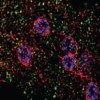A Look Back at 20 Years of Human Genomics
Gene Family Update
This collection contains all previously published Gene Family Updates and will continue to include any new Gene Family Updates that publish.
2023
Edited by: Helena Hodberg-Durdock, Nicole Kleinstreuer and Kim To
Pharmacogenomics Beyond Single Common Genetic Variants
Edited by: Volker M. Lauschke
Multi-omics approaches to unravel gene-environmental interactions in noncommunicable diseases
Edited by: Tesfaye Mersha and Daniel Enquobahrie
CAGI 6: Critical Assessment of Genome Interpretation, Sixth Edition
Edited by: Soren Brunak, Hannah Carter, John Moult
Personalized Nutrition and Healthy Living from a Genomic Perspective
Edited by: Anagnostis Argiriou and Giuseppe Novelli
Mapping the urban wastewater genome towards the understanding of human infectious disease
Edited by: Despo Fatta-Kassinos, Bernd M. Gawlik and Warish Ahmed
2022
Edited by: Xiaoming Shi and Nikolaos S. Thomaidis
2020
Genetically Manipulated Animal Models for Human Disease
Edited by: Ying Chen, Won Yeong Kang, and Hassane Mchaourab
Genomics of COVID-19: Molecular Mechanisms Going from Susceptibility to Severity of the Disease
Edited by: Giuseppe Novelli and Juergen Reichardt
Artificial Intelligence and Genomics
Edited by: Kirill A. Veselkov, Takashi Gojobori, and David van Dijk
2018
Edited by: George Patronis and Hongyu Zhao
2017
Ethics, Law, and Society in Human Genomics
Edited by: Ruth Chadwick
2015
Edited by: Nick M. Makridakis
Edited by: George Patrinos and Chee Seng Ku



